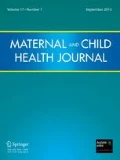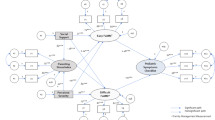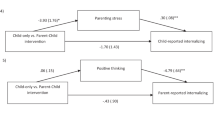Abstract
Objectives Describe and quantify coping skills and prevalence of depressive symptoms in parents of children with special health care needs (CSHCN). Describe the association of coping skills with parental depressive symptoms, severity of child’s condition and family demographic characteristics. Methods A baseline questionnaire was administered to parents of CSHCN 2–11 years old. Data were analyzed cross-sectionally. Coping skills were assessed using F-COPES, and depressive symptoms were measured using CESD 10, both previously tested tools. Multivariable regression models measured the association of coping skills with depressive symptoms, parents’ rating of severity and demographic characteristics. Results Among 129 parents 54% had depressive symptoms above standard normal threshold. Parents with better coping skills had significantly fewer depressive symptoms. The severity of child’s condition, parental marital status and employment status were significantly related to depressive symptoms; after accounting for these factors, better coping skills were still associated with fewer depressive symptoms (P-value < 0.05). Conclusions Parents of CSHCN are at increased risk for depressive symptoms, especially if single and unemployed. In this study better parental coping skills were associated with fewer depressive symptoms, regardless of the severity of child’s condition; and remained significant after accounting for demographic factors. Educational interventions to improve coping skills for parents of children who have a variety of diagnoses and severity levels may potentially mitigate the manifestation of depressive symptoms and in turn improve parenting.

Similar content being viewed by others
Notes
This description represents the MCHB definition of children with special health care needs.
References
Bethell, C. D., Read, D., Blumberg, S. J., & Newacheck, P. W. (2008). What is the prevalence of children with special health care needs? Toward an understanding of variations in findings and methods across three national surveys. Maternal and Child Health Journal, 12(1), 1–14. doi:10.1007/s10995-007-0220-5.
Labbe, E. E. (1996). Emotional states and perceived family functioning of caregivers of chronically ill children. Psychological Reports, 79(3 Pt 2), 1233–1234.
Ratliffe, C. E., Harrigan, R. C., Haley, J., Tse, A., & Olson, T. (2002). Stress in families with medically fragile children. Issues in Comprehensive Pediatric Nursing, 25(3), 167–188. doi:10.1080/01460860290042558.
Leung, D. W., & Slep, A. M. (2006). Predicting inept discipline: The role of parental depressive symptoms, anger, and attributions. Journal of Consulting and Clinical Psychology, 74(3), 524–534. doi:10.1037/0022-006X.74.3.524.
Eakes, G. G., Burke, M. L., & Hainsworth, M. A. (1998). Middle-range theory of chronic sorrow. Image–the Journal of Nursing Scholarship, 30(2), 179–184. doi:10.1111/j.1547-5069.1998.tb01276.x.
Kean, E. M., Kelsay, K., Wamboldt, F., & Wamboldt, M. Z. (2006). Posttraumatic stress in adolescents with asthma and their parents. Journal of the American Academy of Child and Adolescent Psychiatry, 45(1), 78–86. doi:10.1097/01.chi.0000186400.67346.02.
Lamontagne, L. L., Hepworth, J. T., Salisbury, M. H., & Riley, L. P. (2003). Optimism, anxiety, and coping in parents of children hospitalized for spinal surgery. Applied Nursing Research, 16(4), 228–235. doi:10.1016/S0897-1897(03)00052-1.
Lowes, L., & Lyne, P. (2000). Chronic sorrow in parents of children with newly diagnosed diabetes: A review of the literature and discussion of the implications for nursing practice. Journal of Advanced Nursing, 32(1), 41–48. doi:10.1046/j.1365-2648.2000.01418.x.
Magal-Vardi, O., Laor, N., Toren, A., Strauss, L., Wolmer, L., Bielorai, B., et al. (2004). Psychiatric morbidity and quality of life in children with malignancies and their parents. The Journal of Nervous and Mental Disease, 192(12), 872–875. doi:10.1097/01.nmd.0000146881.00129.ec.
Whittemore, R., Urban, A. D., Tamborlane, W. V., & Grey, M. (2003). Quality of life in school-aged children with type 1 diabetes on intensive treatment and their parents. The Diabetes Educator, 29(5), 847–854. doi:10.1177/014572170302900514.
Cox, A. D., Puckering, C., Pound, A., & Mills, M. (1987). The impact of maternal depression in young children. Journal of Child Psychology and Psychiatry, and Allied Disciplines, 28(6), 917–928. doi:10.1111/j.1469-7610.1987.tb00679.x.
Cummings, E. M., & Davies, P. T. (1994). Maternal depression and child development. Journal of Child Psychology and Psychiatry, and Allied Disciplines, 35(1), 73–112. doi:10.1111/j.1469-7610.1994.tb01133.x.
Downey, G., & Coyne, J. C. (1990). Children of depressed parents: An integrative review. Psychological Bulletin, 108(1), 50–76. doi:10.1037/0033-2909.108.1.50.
Lewinsohn, P. M., Olino, T. M., & Klein, D. N. (2005). Psychosocial impairment in offspring of depressed parents. Psychological Medicine, 35(10), 1493–1503. doi:10.1017/S0033291705005350.
Weissman, M. M., Pilowsky, D. J., Wickramaratne, P. J., Talati, A., Wisniewski, S. R., Fava, M., et al. (2006). Remissions in maternal depression and child psychopathology: A STAR*D-child report. Journal of the American Medical Association, 295(12), 1389–1398. doi:10.1001/jama.295.12.1389.
Schor, E. L. (2003). Family pediatrics: Report of the task force on the family. Pediatrics, 111(6 Pt 2), 1541–1571.
Najman, J. M., Williams, G. M., Nikles, J., Spence, S., Bor, W., O’Callaghan, M., et al. (2000). Mothers’ mental illness and child behavior problems: Cause-effect association or observation bias? Journal of the American Academy of Child and Adolescent Psychiatry, 39(5), 592–602. doi:10.1097/00004583-200005000-00013.
Luoma, I., Tamminen, T., Kaukonen, P., Laippala, P., Puura, K., Salmelin, R., et al. (2001). Longitudinal study of maternal depressive symptoms and child well-being. Journal of the American Academy of Child and Adolescent Psychiatry, 40(12), 1367–1374. doi:10.1097/00004583-200112000-00006.
Moore, K. A., Hair, E., Vandivere, S., McPhee, C., McNamara, M., & Ling, T. (2006). Depression among moms: Prevalence, predictors, and acting out among third grade children. Washington DC: Child Trends.
Gibson, C. H. (1995). The process of empowerment in mothers of chronically ill children. Journal of Advanced Nursing, 21(6), 1201–1210. doi:10.1046/j.1365-2648.1995.21061201.x.
Rusch, N., Lieb, K., Bohus, M., & Corrigan, P. W. (2006). Self-stigma, empowerment, and perceived legitimacy of discrimination among women with mental illness. Psychiatric Services (Washington, DC), 57(3), 399–402. doi:10.1176/appi.ps.57.3.399.
Geist, R., Grdisa, V., & Otley, A. (2003). Psychosocial issues in the child with chronic conditions. Best Practice & Research. Clinical Gastroenterology, 17(2), 141–152. doi:10.1016/S1521-6918(02)00142-7.
Singer, G. H., Ethridge, B. L., & Aldana, S. I. (2007). Primary and secondary effects of parenting and stress management interventions for parents of children with developmental disabilities: A meta-analysis. Mental Retardation and Developmental Disabilities Research Reviews, 13(4), 357–369. doi:10.1002/mrdd.20175.
Luther, E. H., Canham, D. L., & Young Cureton, V. (2005). Coping and social support for parents of children with autism. The Journal of School Nursing, 21(1), 40–47. doi:10.1177/10598405050210010901.
Twoy, R., Connolly, P. M., & Novak, J. M. (2007). Coping strategies used by parents of children with autism. Journal of the American Academy of Nurse Practitioners, 19(5), 251–260. doi:10.1111/j.1745-7599.2007.00222.x.
Sullivan, A. (2002). Gender differences in coping strategies of parents of children with Down syndrome. Down’s Syndrome, Research and Practice, 8(2), 67–73. doi:10.3104/reports.132.
Martin, S. C., Wolters, P. L., Klaas, P. A., Perez, L., & Wood, L. V. (2004). Coping styles among families of children with HIV infection. AIDS Care, 16(3), 283–292. doi:10.1080/09540120410001665295.
Cleve, L. V. (1989). Parental coping in response to their child’s spina bifida. Journal of Pediatric Nursing, 4(3), 172–176.
Montagnino, B. A., & Mauricio, R. V. (2004). The child with a tracheostomy and gastrostomy: Parental stress and coping in the home—a pilot study. Pediatr Nurs, 30(5), 373–380, 401.
McPherson, M., Arango, P., Fox, H., Lauver, C., McManus, M., Newacheck, P. W., et al. (1998). A new definition of children with special health care needs. Pediatrics, 102(1 Pt 1), 137–140. doi:10.1542/peds.102.1.137.
Stein, R. E., & Jessop, D. J. (1989). What diagnosis does not tell: The case for a noncategorical approach to chronic illness in childhood. Social Science and Medicine, 29(6), 769–778. doi:10.1016/0277-9536(89)90157-3.
Stein, R. E., & Jessop, D. J. (2003). The impact on family scale revisited: Further psychometric data. Journal of Developmental and Behavioral Pediatrics, 24(1), 9–16.
Child and Adolescent Health Measurement Initiative. (2003). National Survey of Children’s Health, Data Resource Center on Child and Adolescent Health website. Data Resource Center on Child and Adolescent Health website; 2005 [cited 2006 September 6]; Available from: www.nschdata.org.
Child and Adolescent Health Measurement Initiative. (2000–2001). National Survey of Children with Special Health Care Needs, Data Resource Center on Child and Adolescent Health website. Data Resource Center on Child and Adolescent Health website; 2005 [cited 2006 September 6]; Available from: http://cshcndata.org/ViewDocument.aspx?item=67.
McCubbin, H., & Thompson, A. (1991). Family assessment inventories for research and practice. Madison, WI: University of Wisconsin System.
Stanford Patient Education Research Center. Center for Epidemiological Studies Short Depression Scale (CES-D 10). Palo Alto, CA [cited Accessed 2004]; Available from: http://patienteducation.stanford.edu/research/cesd10.html.
Radloff, L. (1977). The CES-D scale: A self-report depression scale for research in the general population. Applied Psychological Measurement, 1, 385–401. doi:10.1177/014662167700100306.
Zauszniewski, J. A., Morris, D. L., Preechawong, S., & Chang, H. J. (2004). Reports on depressive symptoms in older adults with chronic conditions. Research and Theory for Nursing Practice, 18(2–3), 185–196. doi:10.1891/rtnp.18.2.185.61280.
Zich, J. M., Attkisson, C. C., & Greenfield, T. K. (1990). Screening for depression in primary care clinics: The CES-D and the BDI. International Journal of Psychiatry in Medicine, 20(3), 259–277.
Hybels, C. F., Blazer, D. G., & Pieper, C. F. (2001). Toward a threshold for subthreshold depression: An analysis of correlates of depression by severity of symptoms using data from an elderly community sample. The Gerontologist, 41(3), 357–365.
Stata Corp. (2004). Stata Statistical Software. Release 8.2 ed. College Station, TX: StataCorp LP.
Centers for Disease Control. (1991). Followup to the 1988 National Maternal and Infant Health Survey Public-use Data Files. [cited 2006 April]; Available from: http://www.cdc.gov/nchs/products/elec_prods/subject/lfnmihs.htm.
Lanzi, R. G., Pascoe, J. M., Keltner, B., & Ramey, S. L. (1999). Correlates of maternal depressive symptoms in a national Head Start program sample. Archives of Pediatrics and Adolescent Medicine, 153(8), 801–807.
McCubbin, H. I., Thompson, E. A., Thompson, A. I., McCubbin, M. A., & Kaston, A. J. (1993). Culture, ethnicity, and the family: Critical factors in childhood chronic illnesses and disabilities. Pediatrics, 91(5 Pt 2), 1063–1070.
Patterson, J. M., & Blum, R. W. (1993). A conference on culture and chronic illness in childhood: Conference summary. Pediatrics, 91(5 Pt 2), 1025–1030.
Kuhlthau, K. A., & Perrin, J. M. (2001). Child health status and parental employment. Archives of Pediatrics and Adolescent Medicine, 155(12), 1346–1350.
Nelson, A. E., Miles, M. S., Reed, S. B., Davis, C. P., & Cooper, H. (1994). Depressive symptomatology in parents of children with chronic oncologic or hematologic disease. Journal of Psychosocial Oncology, 12(4), 61–75. doi:10.1300/J077V12N04_04.
Clements, D. B., Copeland, L. G., & Loftus, M. (1990). Critical times for families with a chronically ill child. Pediatr Nurs, 16(2), 157–161, 224.
Heneghan, A. M., Mercer, M., & DeLeone, N. L. (2004). Will mothers discuss parenting stress and depressive symptoms with their child’s pediatrician? Pediatrics, 113(3 Pt 1), 460–467. doi:10.1542/peds.113.3.460.
Heneghan, A. M., Silver, E. J., Bauman, L. J., & Stein, R. E. (2000). Do pediatricians recognize mothers with depressive symptoms? Pediatrics, 106(6), 1367–1373. doi:10.1542/peds.106.6.1367.
Olson, A. L., Dietrich, A. J., Prazar, G., Hurley, J., Tuddenham, A., Hedberg, V., et al. (2005). Two approaches to maternal depression screening during well child visits. Journal of Developmental and Behavioral Pediatrics, 26(3), 169–176. doi:10.1097/00004703-200506000-00002.
Nolan, K. J., Camfield, C. S., & Camfield, P. R. (2006). Coping with Dravet syndrome: Parental experiences with a catastrophic epilepsy. Developmental Medicine and Child Neurology, 48(9), 761–765. doi:10.1017/S0012162206001629.
Acknowledgments
The authors would like to thank the parents who participated in the Building of Family Strengths project. Ms. Megan Sety coordinated recruitment and data collection. Funding was provided through Agency for Health Care Research and Quality, R01 HS13384, PI: Gail M. Kieckhefer.
Author information
Authors and Affiliations
Corresponding author
Rights and permissions
About this article
Cite this article
Churchill, S.S., Villareale, N.L., Monaghan, T.A. et al. Parents of Children with Special Health Care Needs Who have Better Coping Skills have Fewer Depressive Symptoms. Matern Child Health J 14, 47–57 (2010). https://doi.org/10.1007/s10995-008-0435-0
Received:
Accepted:
Published:
Issue Date:
DOI: https://doi.org/10.1007/s10995-008-0435-0




